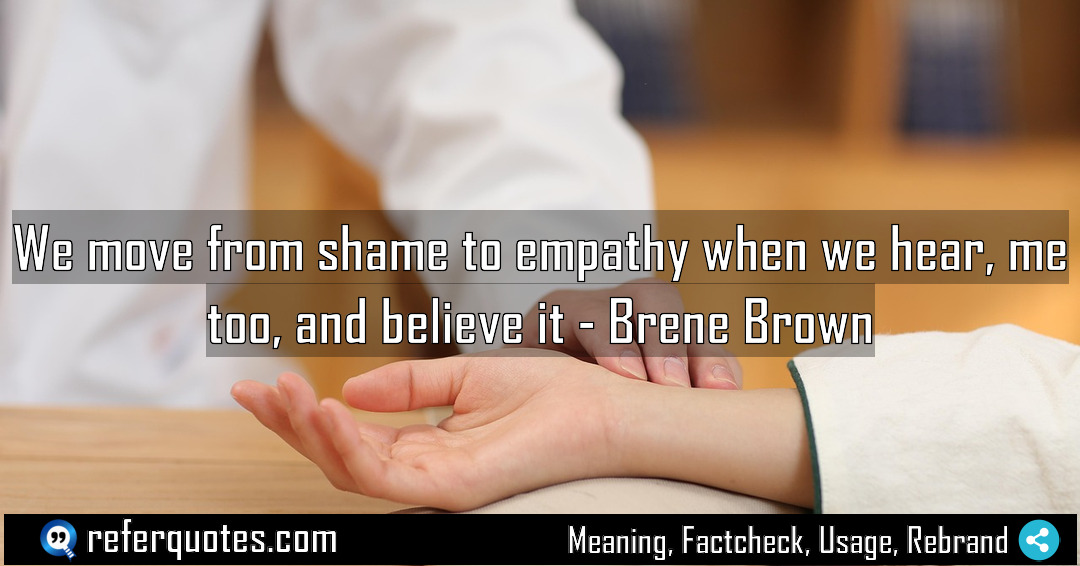
We move from shame to empathy when we hear… that’s the core of Brene Brown’s genius. It’s about how shared experience instantly dissolves isolation and builds connection.
Share Image Quote:
Table of Contents
Meaning
Shame loses its power the moment we realize our painful experiences are not ours alone. That “me too” is the bridge from lonely suffering to shared humanity.
Explanation
Let me break this down. Shame, at its core, is the intensely painful feeling that we are unworthy of connection. It thrives in silence and secrecy. It’s that voice that whispers, “You’re the only one who messed up this badly.” But here’s the magic. When someone looks you in the eye and says, “Me too. I’ve been there,” something profound happens. That shared acknowledgment, that moment of true seeing, is an empathic connection. It doesn’t erase the pain, but it instantly dismantles the isolation. It reframes the experience from “I am a flawed person” to “I am a person who had a flawed experience.” And that shift? That’s everything.
Quote Summary
Reading Level50
Aesthetic Score70
Origin & Factcheck
This powerful line comes directly from Brené Brown’s 2004 book, Women & Shame: Reaching Out, Speaking Truths, which was published in the United States. It’s a cornerstone of her early research, long before her famous TED Talk. You won’t find it falsely attributed to anyone else because the concept is so uniquely *her*.
Attribution Summary
Author Bio
Dr Brene Brown is the author of books such as Daring Greatly and The Power of Vulnerability. The TED talk and Netflix production based on her research reached out to millions of audience. She researches effects of courage and vulnerability in shaping people's work and relationships. She leads the Brené Brown Education and Research Group and provides evidence-based insights into practical tools to help people train themselves
Official Website |Facebook | X | Instagram | YouTube |
Where is this quotation located?
| Quotation | We move from shame to empathy when we hear, me too, and believe it |
| Book Details | Publication Year: 2004; (other edition details unknown) |
| Where is it? | Approximate page from 2004 Hazelden edition, Chapter: Empathy |
Context
This quote sits at the heart of her research on women and shame. In the book, she’s talking about the specific, soul-crushing weight of the expectations placed on women—to be perfect, to be nice, to do it all. The “me too” in this context is the lifeline women throw each other when they dare to be vulnerable about failing to meet those impossible standards.
Usage Examples
So, how do you actually use this? It’s a tool for leaders, coaches, parents, and friends.
- For a Team Leader: When a team member is beating themselves up over a missed deadline, instead of just saying “It’s okay,” you could share a time you made a similar mistake. “I remember a project where I completely dropped the ball. It was brutal, and I felt the same way. Here’s what we learned from it…” You’re not just excusing it; you’re building trust.
- For a Parent: Your teenager is humiliated after a social blunder. Instead of dismissing it (“It’s not a big deal!”), a simple, “Ugh, I remember feeling so awkward at that age when something like that happened to me,” can open a door. It validates their feeling without magnifying the event.
- For a Friend: A friend confesses a deep insecurity about their parenting. The most powerful response isn’t advice. It’s, “Thank you for telling me. I have felt that exact same fear.” That’s the “me too” that heals.
To whom it appeals?
Share This Quote Image & Motivate
Motivation Score74
Popularity Score71
Shareability Score69
Common Questions
Question: Is “me too” the same as giving advice?
Answer: Absolutely not. In fact, advice can often shut down vulnerability. “Me too” is about connection, not correction. It’s listening and relating, not fixing.
Question: What if I haven’t had the exact same experience? Can I still say “me too”?
Answer: Great question. You have to be authentic. If you haven’t lived it, don’t fake it. Instead, you can connect to the *feeling* behind it. “I haven’t been in that exact situation, but I know that feeling of being completely overwhelmed and alone. Thank you for sharing that with me.” That’s still powerful empathy.
Question: How is this different from just shifting the conversation to myself?
Answer: The key is intent. If you’re saying “me too” and then launching into a long story about yourself, that’s hijacking. The goal is to use your story briefly to make them feel seen, and then hand the focus back to them. It’s a bridge, not a stage.
Similar Quotes
Shame hates words wrapped in empathy because it’s a powerful antidote. When you respond to someone’s shame with genuine understanding, you literally disarm its power. It’s a game-changer for anyone…
You know, when Brene Brown said “Shame cannot survive empathy,” she was giving us the ultimate key to disarming one of our most toxic emotions. It’s not about fighting shame,…
Empathy is not something we do… it’s something we are. This distinction from Rosenberg is absolutely foundational. It changes the entire game from performance to presence. Table of Contents Meaning…
When we speak shame, we risk rejection; when we stay silent… that’s the real gut punch from Brené Brown. It’s about how silence is a self-imposed prison, and speaking up,…
We cannot grow when we are in shame… it’s a simple but profound truth. This idea fundamentally reshapes how we think about personal development and leadership. It forces us to…
